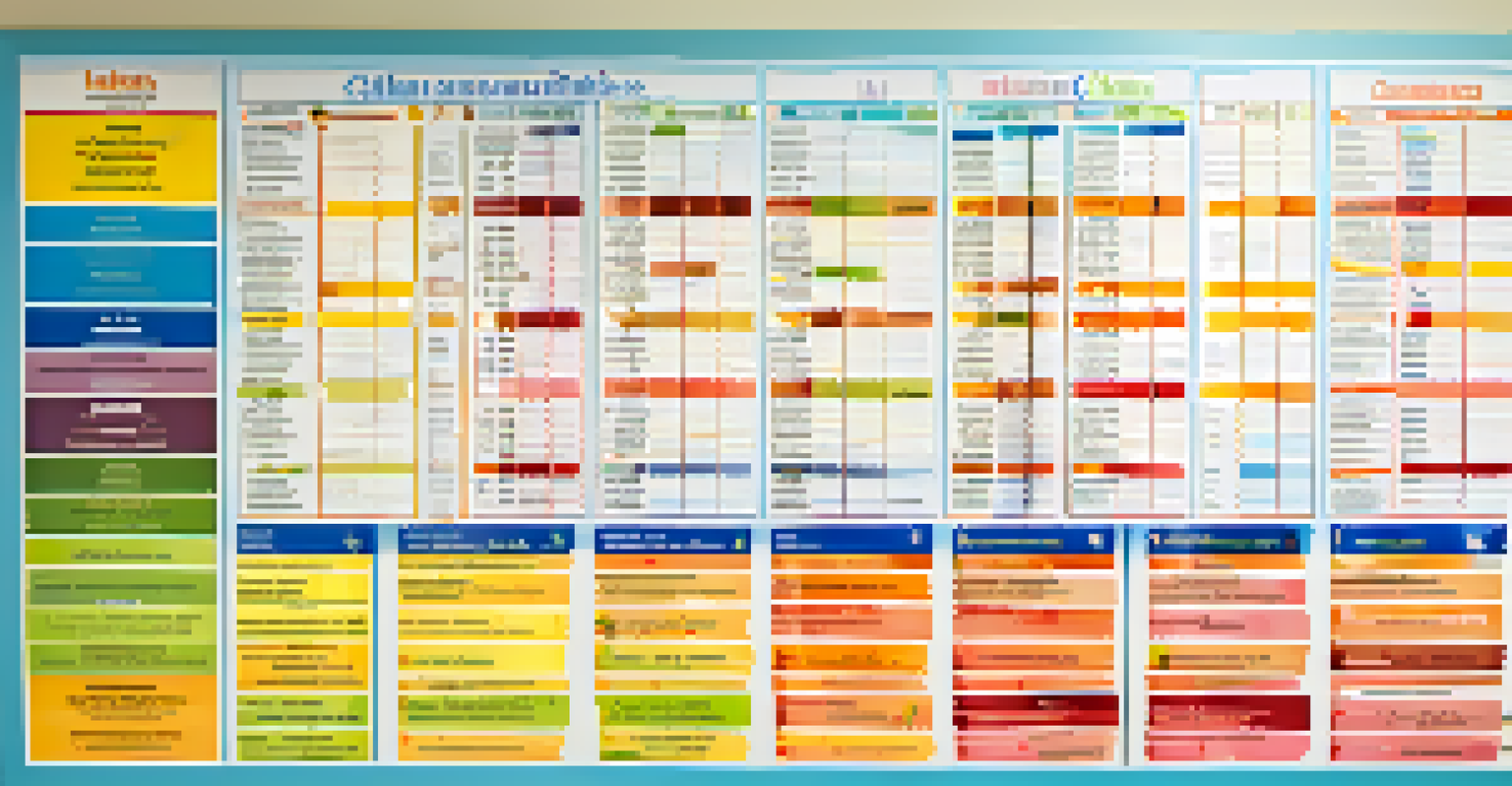The Importance of Vaccinations for Pregnant Women and Infants

Understanding Vaccinations: A Key to Health
Vaccinations are medical interventions that help prepare the body to fight off diseases. By introducing a harmless component of a virus or bacteria, vaccines stimulate the immune system to recognize and combat these pathogens in the future. This process is particularly crucial for pregnant women and infants, as they are more vulnerable to certain infections.
Vaccines are the tugboats of preventive health.
The importance of vaccinations cannot be overstated, as they not only protect the individual but also contribute to community health through herd immunity. When a significant portion of the population is vaccinated, it helps prevent the spread of diseases, protecting those who cannot be vaccinated, such as newborns and individuals with specific health conditions. Essentially, vaccinations create a safety net for everyone.
Moreover, vaccines have been instrumental in reducing the incidence of severe diseases like measles, whooping cough, and influenza. By opting for vaccinations, pregnant women play a vital role in safeguarding not only their health but also the well-being of their future child.
Vaccination Recommendations for Pregnant Women
Pregnant women are often advised to receive certain vaccinations to ensure both their health and the health of their unborn child. Key vaccinations include the flu shot and the Tdap vaccine, which protects against tetanus, diphtheria, and pertussis (whooping cough). These vaccinations are typically recommended during the third trimester to maximize the transfer of protective antibodies to the baby.

Receiving these vaccines during pregnancy can significantly reduce the risk of the mother contracting these diseases, which can have serious consequences for both her and her baby. For instance, whooping cough can be particularly dangerous for newborns, leading to severe respiratory issues, making vaccination during pregnancy a protective measure.
Vaccinations Protect Community Health
Vaccinations not only safeguard individual health but also contribute to herd immunity, protecting those who cannot be vaccinated.
Additionally, it’s essential for pregnant women to discuss their vaccination history with healthcare providers. This conversation can help identify any missed vaccines that may be crucial for their health and the baby's development.
The Impact of Vaccinations on Infant Health
Vaccinations play a critical role in protecting infants from various infectious diseases during their early months and years. Infants are born with some immunity, but it is not enough to fight off many illnesses. Vaccines help bridge that gap, providing essential protection against diseases like polio, measles, and hepatitis B.
The greatest weapon against stress is our ability to choose one thought over another.
The vaccination schedule typically begins at birth, with a series of shots given at specific intervals. This systematic approach ensures that infants develop immunity over time, allowing their bodies to combat infections effectively. For example, the MMR vaccine, which protects against measles, mumps, and rubella, is administered around 12-15 months of age.
Moreover, vaccinations can prevent complications associated with these diseases, such as hospitalization and long-term health issues. By adhering to the recommended vaccination schedule, parents can significantly reduce their child's risk of encountering these potentially life-threatening diseases.
Addressing Common Concerns About Vaccinations
Despite the overwhelming evidence supporting vaccinations, some parents express concerns about their safety and potential side effects. It’s important to understand that vaccines are rigorously tested for safety and efficacy before being approved for public use. Side effects are typically mild and temporary, such as soreness at the injection site or a low-grade fever.
Healthcare providers encourage parents to discuss any concerns with them, as they can provide accurate information and address myths surrounding vaccinations. Educating oneself about the facts can help alleviate worries and foster a sense of trust in the vaccination process.
Pregnant Women Need Key Vaccines
Certain vaccines, such as the flu shot and Tdap, are crucial for pregnant women to protect both their health and that of their unborn child.
Additionally, considering the risks of not vaccinating is crucial. The resurgence of preventable diseases can lead to outbreaks, endangering not only unvaccinated children but also those who are vulnerable due to health conditions. Making informed decisions based on credible information is vital.
The Role of Healthcare Providers in Vaccination
Healthcare providers are instrumental in educating expectant mothers and parents about the importance of vaccinations. They can offer tailored advice based on individual health backgrounds and circumstances. This personalized approach ensures that families receive the most relevant information regarding vaccinations for both mothers and infants.
Regular check-ups and consultations provide an opportunity to discuss vaccination schedules, address concerns, and clarify misconceptions. Providers can help families navigate the sometimes overwhelming information available and guide them toward making informed choices.
Moreover, healthcare providers can remind parents of upcoming vaccinations or booster shots, ensuring that children stay on track with their immunization schedule. This proactive engagement is crucial for maintaining community health and preventing outbreaks.
Community Immunity: The Importance of Herd Immunity
Herd immunity occurs when a significant portion of the population is vaccinated, reducing the spread of infectious diseases. This phenomenon is particularly important for protecting those who cannot be vaccinated, such as infants, the elderly, or individuals with weakened immune systems. When vaccinated individuals help curb disease transmission, they create a safer environment for everyone.
The more people who are vaccinated, the harder it is for diseases to spread. This collective protection is vital in preventing outbreaks, as seen in the resurgence of measles in areas with low vaccination rates. By vaccinating pregnant women and infants, communities can significantly contribute to herd immunity, ensuring a healthier future for all.
Infants Benefit from Timely Vaccines
Following the recommended vaccination schedule is essential for infants to develop immunity against serious diseases.
Understanding the role of herd immunity emphasizes the communal responsibility we share regarding vaccinations. It’s not just about individual health; it’s about protecting neighbors, friends, and the broader community.
Conclusion: Committing to Vaccination for Better Health
In conclusion, vaccinations are a cornerstone of public health, especially for pregnant women and infants. They provide crucial protection against serious diseases, promote the health of mothers and babies, and contribute to the wider community's safety. By prioritizing vaccines during pregnancy and infancy, families can help ensure a healthier tomorrow.
The commitment to vaccination is a proactive step towards safeguarding not only individual health but also the health of future generations. As we foster a culture of vaccination, we build a community that values health, safety, and well-being for all.

Ultimately, the decision to vaccinate is an informed one, supported by science and the shared goal of reducing illness and promoting a healthier society. Engaging in conversations with healthcare professionals and staying informed can empower families to make the best choices regarding vaccinations.